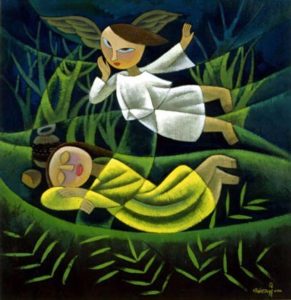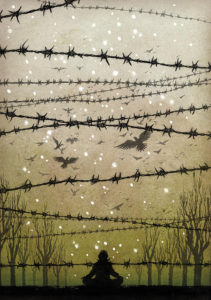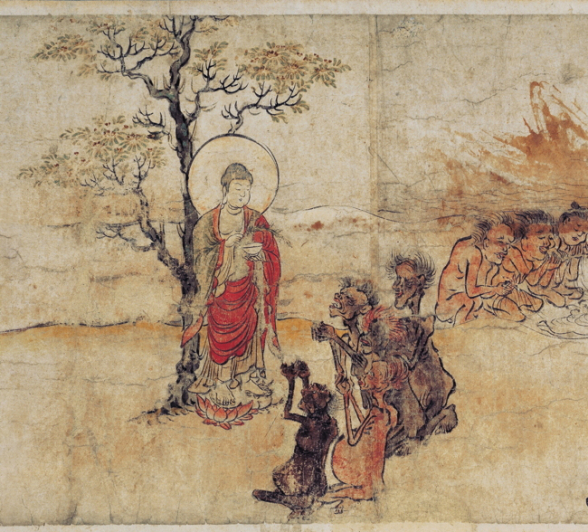
Your body is woven from the light of heaven. Are you aware that its purity and swiftness is the envy of angels and its courage keeps even devils away. — attributed to Rumi
Lord, the demons still are thriving in the gray cells of the mind:
tyrant voices, shrill and driving, twisted thoughts that grip and bind,
doubts that stir the heart to panic, fears distorting reason’s sight,
guilt that makes our loving frantic, dreams that cloud the soul with fright.
… Clear our thought and calm our feeling; still the fractured, warring soul.
By the power of your healing make us faithful, true, and whole.
— Thomas Troeger (excerpt from hymn ‘Silence, frenzied, unclean spirit’)
We consider mindful, spiritual and positive psychology approaches to issues with which we wrestle. These issues may be known in Biblical texts as ‘unclean spirits’ and also referred to in our culture as as inner demons or in Buddhist canon as hungry ghosts. We offer below some resources to reinforce the practice of calling on God, love, compassion, acceptance … maybe through simple exercises and spiritual practices, or with the belief in God, Christ, Spirit, angels, saints, and bodhisattvas as well as self and other people in community.
- OptionB.org, Lee Daniel Kravetz: Guide to Grounded Hope
- Lama Tsultrim Allione, How to Feed your Demons
- Thich Nhat Hahn, 5 Practices for Nurturing Happiness and Dharma Talk on ‘Transforming Negative Habit Energies’
- Plum Village (Thich Nhat Hahn’s community), Being Mindful in Daily Life
- Center for Action and Contemplation, Fr Richard Rohr, Daily Meditations (must sign up for these)
- Steve Goodheart, Skillful Ways to Deal with your Demons
- Good Therapy, Core Mindfulness: Dialectical Behavioral Therapy and Dialectical Behavior Therapy
- Positive Psychology Program: 12 Positive Psychology Interventions and 3 Ways to Find the One You Need11
- Positive Psychology Program: 22 Mindfulness Exercises, Techniques and Activities
- Psychology Today, Inner selves: Calming the Demons
- Psychology Today: What Is Positive Psychology and What Is It Not?
- Ignatian Spirituality, The Daily Examen
Inner Demons — Julia Brennan
(Link to youtube video of song)
They say don’t let them in, Close your eyes and clear your thoughts again
But when I’m all alone, they show up on their own
‘Cause inner demons fight their battles with fire
Inner demons don’t play by the rules
They say “Just push them down, just fight them harder
Why would you give up on it so soon?”
So angels, angels please just keep on fighting. Angels don’t give up on me today
‘Cause the demons they are there, they just keep biting
‘Cause inner demons just won’t go away
So angels please, hear my prayer. Life is pain, life’s not fair
So angels please, please stay here. Take the pain, take the fear
They say it won’t be hard, they can’t see the battles in my heart
But when I turn away, The demons seem to stay
‘Cause inner demons don’t play well with angels
They cheat and lie and steal and break and bruise
Angels please protect me from these rebels, This is a battle I don’t want to lose
So angels, angels please just keep on fighting. Angels don’t give up on me today
‘Cause the demons they are there, they just keep biting
‘Cause inner demons just won’t go away
So angels please, hear my prayer. Life is pain, life’s not fair
So angels please, please stay here. Take the pain, take the fear
Demons (excerpt) — Imagine Dragons
Link: Youtube view link
… Your eyes, they shine so bright, I want to save their light
I can’t escape this now, Unless you show me how
When you feel my heat, Look into my eyes
It’s where my demons hide, It’s where my demons hide
Don’t get too close, It’s dark inside
It’s where my demons hide, It’s where my demons hide
Of Angels, Saints, and Bodhisattvas

God occasionally drops a handkerchief. These handkerchiefs are called saints. — Frederick Buechner
Every blade of grass has its angel that bends over it and whispers, ‘Grow, grow.’ — Talmud
Through love the devil
becomes an angel.
Through love stones
become soft as butter.
Through love grief
is like delight.
Through love demons
become the servants of God.
— attributed to Rumi
You don’t have to be famous, or perfect, or dead. You just have to be you—the one-of-a-kind, never-to-be-repeated human being whom God created you to be—to love as you are loved, to throw your arms around the world, to shine like the sun. You don’t have to do it alone, either. You have all this company—all these saints sitting right here whom you can see for yourself plus those you cannot… all of them egging you on, calling your name, and shouting themselves hoarse with encouragement. Because you are part of them, and they are part of you, and all of us are knit together in the communion of saints … — Barbara Brown Taylor
My job is to point to Christ and to preach the Gospel and to remind people that they’re absolutely loved … and all of their mess-ups are not more powerful than God’s mercy and God’s ability to sort of redeem us and to bring good out of bad. — Nadia Bolz-Weber
We are not enemies, but friends. We must not be enemies. Though passion may have strained, it must not break our bonds of affection. The mystic chords of memory will swell again when again touched, as surely they will be, by the better angels of our nature. — Abraham Lincoln
All the joy the world contains Has come through wishing happiness for others. All the misery the world contains Has come through wanting pleasure for oneself. ― Śāntideva, The Way of the Bodhisattva
A bodhisattva is an ordinary person who takes up a course in his or her life that moves in the direction of Buddha. … Most people live by their desires or karma … We are born into this world with our desires and may live our lives just by reacting or responding to them. In contrast … a bodhisattva … lives by vow. The life that flows through each of us and through everything around us is actually all connected. To say that, of course, means that who I really am cannot be separated from all the things that surround me. Or, to put it another way, all sentient beings have their existence and live within my life. So needless to say, that includes even the fate of all mankind—that, too, lies within me … a bodhisattva, though undeniably still an ordinary human being like everyone else … we work to discover and manifest the most vital and alive posture that we can take in living out our life … A bodhisattva is one who sees the world through adult eyes and whose actions are the actions of a true adult. — Kosho Uchiyama, Tricycle.org, What Is Bodhisattva?
…our souls may be consumed by shadows, but that doesn’t mean we have to behave as monsters. ― Emm Cole, The Short Life of Sparrows
You cannot defeat darkness by running from it, nor can you conquer your inner demons by hiding them from the world. In order to defeat the darkness, you must bring it into the light. ― Seth Adam Smith
A bodhisattva is someone who says from the depth of his or her heart, “I want to be liberated and find ways to overcome all the problems of the world. I want to help all my fellow beings to do likewise. I long to attain the highest state of everlasting peace and happiness, in which all suffering has ceased, and I want to do so for myself and for all sentient beings.” According to the Buddha’s teaching, anyone who makes this firm and heartfelt commitment is a bodhisattva. We become bodhisattvas from the moment we have this vast and open heart, called bodhichitta, the mind bent on bringing lasting happiness to all sentient beings. — Ringu Tulku Rinpoche, Daring Steps Toward Fearlessness: The Three Vehicles of Buddhism
When you resolve to become pious, the devil in your nature cries out at you, “Tread not those paths, O confused one; distress and poverty will overcome you. You will be despised, let down by friends, you will regret it.” Dread of the devil has bound their souls; the cries of the devil are the drover of the damned; the call of the Lord is a guardian of the saints. — attributed to Rumi
 Dianne Bergant provides a challenging reflection on the demons that hold us in bondage, demons that she renames as “dysfunction and sin” that trap us “between good and evil…human finitude and failure.” … seduces us in more ways than we can count, and we are often caught in its web before we recognize what has happened. — Kathryn Matthews, Sermon Seeds (UCC), commentary on Mark 1
Dianne Bergant provides a challenging reflection on the demons that hold us in bondage, demons that she renames as “dysfunction and sin” that trap us “between good and evil…human finitude and failure.” … seduces us in more ways than we can count, and we are often caught in its web before we recognize what has happened. — Kathryn Matthews, Sermon Seeds (UCC), commentary on Mark 1
Hungry ghosts are demons who are perpetually craving food but are unable to take in nourishment. Hungry ghosts are not a myth–they live among us as people who may have enough food and clothing but who are still hungry for knowledge, for love, for hope, and for something to believe in. We have to build a little bit of community everywhere we go so these hungry ghosts can find refuge. It is the atmosphere of harmony and community that can help the hungry ghosts get rooted and undo their knots of suffering. — Thich That Hahn, Two Treasures
Demons (maras in Sanskrit) are not blood-thirsty ghouls waiting for us in dark corners. Demons are within us. They are energies that we experience every day, such as fear, illness, depression, anxiety, trauma, relationship difficulties, and addiction. Anything that drains our energy and blocks us from being completely awake can be considered a demon … Feeding our demons, rather than fighting them, contradicts the conventional approach of fighting against whatever assails us. But it turns out that it is a remarkably effective path to inner integration. — Lama Tsultrim Allione
In Jesus’ day people thought unclean spirits were behind illnesses and other phenomena that they couldn’t explain. The word “unclean” didn’t necessarily mean literally dirty, although it could mean that. The word “unclean” basically meant disordered, mixed up, out of place in some way … I tried to put my finger on just what an unclean spirit is, and here’s the summary I came up with: An unclean spirit is a disruptive spirit, a negative force or power that resists the will and way of God and oppresses people. Unclean spirits hold people captive, hold them down, preventing them from being healthy and whole as God intends. — Pastor Bob, Patheos, commentary on Mark 1
I have used Dom Helder Camara’s inspired teaching on the “spiral of violence” for many years, overlaying that phrase with traditional Catholic moral teaching, which states that the sources of evil are the world, the flesh, and the devil—in that order. This model simply illustrates the three sources of evil and thus violence … By “world,” I am not referring to Creation, but to “the System.” It’s the way groups, cultures, institutions, and nations organize themselves to be in control. This may be the most hidden, the most disguised, and the most denied level of evil. We cannot see it because we are inside of it and because we cannot see beyond our own self-interest and self-protection … The flesh is … individual sin, personal mistakes that you and I make. No one is denying that this is a level of evil and sin, and often the most apparent one. But when we only point our finger at the second level of the spiral, blaming individuals and punishing people, we are largely wasting our time … At the top of the spiral of violence sits “the devil.” The word “devil,” like “demon,” is a personification of a power that is hard to name or describe because it’s so disguised and even idealized as good and necessary. If “the world” is hidden structural violence, then “the devil” is sanctified and legitimated violence—violence that is deemed necessary to control the angry flesh and the world run amuck. — Fr. Richard Rohr, The World, the Flesh, and the Devil: The Spiral of Violence, Center for Action and Contemplation
… It is about evil in this world. And not just abstract evil, but tangible evil that possesses. Evil that restrains our lives, our hope, our faith. … In any case, it is evident that from the beginning that this unclean spirit is not alone. That its strength perhaps relies on its numbers. We too might relate to this reality. That when we face times of darkness and despair in our lives, it seems to multiply. To touch the many aspects of our lives. Until it seems like the whole world is against us. Such is the nature of darkness in our lives … We must not forget that the unclean spirit in this story was part of an “us,” part of a community. Only as a community can any of us truly face the darkness … It is true that the acts of individuals are important. However, it is as a community that we are truly the body of Christ. None of us here are completely holy, completely perfect in every way. But together we combine not only our collective weaknesses, but our collective strengths. — John Shore, Patheos, commentary on Mark 1
The Hungry Ghost – or the state of being that it represents – is something found inside us. The type of Hungry Ghost may be different for each of us, but the energy behind the hunger is the same. There is something we crave, something we feel that we desperately need to be happy. We’re always wanting something – it’s our fundamental illness. This could take the form of the craving of addiction. It could be the greed for money or possessions … It could be a relentless craving for fame, for recognition, or even for whatever our concept of enlightenment is. … Our practice is the clear seeing and awareness, the acceptance of what is here, as it is. That’s a dramatic change, right there, from our usual way. — Deirde Eisho Petersen, dharma talk, Red Rocks Zen Circle
HEALTHY VOICES

Seeing, hearing, feeling, are miracles, and each part and tag of me is a miracle. Divine am I inside and out, and I make holy whatever I touch or am touch’d from … — Walt Whitman, Song of Myself
— Eminem, ‘Guilty Conscience’It won’t give up, it wants me dead, Goddamn this noise inside my head
— Nine Inch Nails, ‘The Becoming’
I’m friends with the monster that’s under my bed, Get along with the voices inside of my head …
— Rihanna, ‘The Monster’
… there is a howling she can hear she does not understand is here is hers. like she is hearing in her own ears howling wolf long canine knives & clanking richter rackets … — Kamau Brathwaite, Kumina
 It is estimated that between 5% and 28% of the general population hears voices that other people do not … Most people have had at least one experience of hearing a voice when there was no one around them. One study found that only around 25% of persons who hear voices also have a psychotic disorder. While children below the age of 12 have reported hearing voices, in 75% of cases, the voices stopped by the age of 13. Where the voices persist through to adolescence and adulthood, it usually is the case that there is an underlying mental health issue … Hearing voices are still considered by psychiatry as an auditory hallucination and as a symptom of conditions such as schizophrenic disorders, manic depression and psychosis. Traumatic life experiences (e.g. sexual abuse , neglect, loss of a parent) are considered to be among the most significant triggers of auditory hallucinations, particularly among children. As many as 70% of participants in one study reported that hearing voices started following a traumatic or significant emotional event. — Mental Health, UK
It is estimated that between 5% and 28% of the general population hears voices that other people do not … Most people have had at least one experience of hearing a voice when there was no one around them. One study found that only around 25% of persons who hear voices also have a psychotic disorder. While children below the age of 12 have reported hearing voices, in 75% of cases, the voices stopped by the age of 13. Where the voices persist through to adolescence and adulthood, it usually is the case that there is an underlying mental health issue … Hearing voices are still considered by psychiatry as an auditory hallucination and as a symptom of conditions such as schizophrenic disorders, manic depression and psychosis. Traumatic life experiences (e.g. sexual abuse , neglect, loss of a parent) are considered to be among the most significant triggers of auditory hallucinations, particularly among children. As many as 70% of participants in one study reported that hearing voices started following a traumatic or significant emotional event. — Mental Health, UK
Hearing Voices (links to more info)
- Eleanor Longden, Ted Talk, ‘Voices in my Head’
- Allen Frances, Psychiatry and Hearing Voices
- Psychology Today, How the Brain Can Hear Voices
- Hearing Voices organization
- Mental Health UK Hearing Voices
- The Conversation Hearing Voices
- Mad in America, Living Mindfully with Voices

